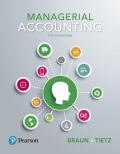
Apply activity cost allocation rates (Learning Objective 2)
SUSTAINABILITY
Holiday Industries manufactures a variety of custom products. The company has traditionally used a plantwide manufacturing
Up to this point, hazardous waste disposal fees have been absorbed into the plantwide manufacturing overhead rate and allocated to all products as part of the manufacturing overhead process. Recently, the company has been experiencing significantly increased waste-disposal fees for hazardous waste generated by certain products, and as a result, profit margins on all products have been negatively impacted. Company management wants to implement an activity-based costing system so that managers know the cost of each product, including its hazardous waste disposal costs.
Expected usage and


During the year, Job 356 is started and completed. Usage for this job follows:
| 290 pounds of direct materials at $35 per pound |
| 20 direct labor hours used at $20 per labor hour |
| 60 machine hours used |
| 9 change orders |
| 60 pounds of hazardous waste generated |
Requirements
- 1. Calculate the cost of Job 356 using the traditional plantwide manufacturing overhead rate based on machine hours.
- 2. Calculate the cost of Job 356 using activity-based costing.
- 3. If you were a manager, which cost estimate would provide you more useful information? How might you use this information?
Want to see the full answer?
Check out a sample textbook solution
Chapter 4 Solutions
Managerial Accounting (5th Edition)
- Nonearrow_forwardDepartment L had 600 units 60% completed in process at the beginning of June, 6,000 units completed during June, and 700 units 30% completed at the end of June. Using the first-in, first-out method of inventory costing, what was the number of equivalent units of production for conversion costs for the period?arrow_forwardHello tutor please provide this question solution accountingarrow_forward
 Cornerstones of Cost Management (Cornerstones Ser...AccountingISBN:9781305970663Author:Don R. Hansen, Maryanne M. MowenPublisher:Cengage Learning
Cornerstones of Cost Management (Cornerstones Ser...AccountingISBN:9781305970663Author:Don R. Hansen, Maryanne M. MowenPublisher:Cengage Learning Excel Applications for Accounting PrinciplesAccountingISBN:9781111581565Author:Gaylord N. SmithPublisher:Cengage Learning
Excel Applications for Accounting PrinciplesAccountingISBN:9781111581565Author:Gaylord N. SmithPublisher:Cengage Learning

